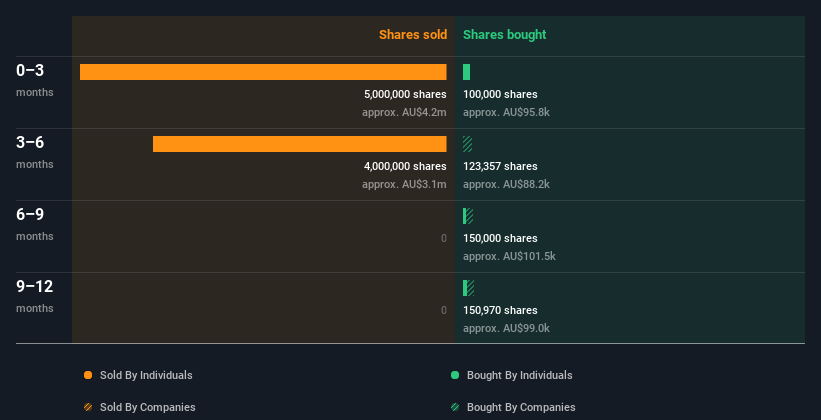- Australia
- /
- Real Estate
- /
- ASX:FRI
Insider Buying: Finbar Group Executive Chairman Bought AU$96k Of Shares

Whilst it may not be a huge deal, we thought it was good to see that the Finbar Group Limited (ASX:FRI) Executive Chairman, John Chan, recently bought AU$96k worth of stock, for AU$0.96 per share. Although the purchase is not a big one, by either a percentage standpoint or absolute value, it can be seen as a good sign.
See our latest analysis for Finbar Group
The Last 12 Months Of Insider Transactions At Finbar Group
Over the last year, we can see that the biggest insider sale was by the insider, Calogero Rubino, for AU$4.1m worth of shares, at about AU$0.83 per share. That means that an insider was selling shares at slightly below the current price (AU$0.98). When an insider sells below the current price, it suggests that they considered that lower price to be fair. That makes us wonder what they think of the (higher) recent valuation. However, while insider selling is sometimes discouraging, it's only a weak signal. We note that the biggest single sale was only 32% of Calogero Rubino's holding. Calogero Rubino was the only individual insider to sell shares in the last twelve months.
In the last twelve months insiders purchased 211.07k shares for AU$170k. But insiders sold 9.00m shares worth AU$7.2m. Calogero Rubino ditched 9.00m shares over the year. The average price per share was AU$0.80. You can see a visual depiction of insider transactions (by companies and individuals) over the last 12 months, below. If you want to know exactly who sold, for how much, and when, simply click on the graph below!

For those who like to find hidden gems this free list of small cap companies with recent insider purchasing, could be just the ticket.
Insider Ownership Of Finbar Group
I like to look at how many shares insiders own in a company, to help inform my view of how aligned they are with insiders. Usually, the higher the insider ownership, the more likely it is that insiders will be incentivised to build the company for the long term. It appears that Finbar Group insiders own 23% of the company, worth about AU$60m. This level of insider ownership is good but just short of being particularly stand-out. It certainly does suggest a reasonable degree of alignment.
So What Do The Finbar Group Insider Transactions Indicate?
Unfortunately, there has been more insider selling of Finbar Group stock, than buying, in the last three months. Despite some insider buying, the longer term picture doesn't make us feel much more positive. But it is good to see that Finbar Group is growing earnings. Insiders own shares, but we're still pretty cautious, given the history of sales. We're in no rush to buy! So while it's helpful to know what insiders are doing in terms of buying or selling, it's also helpful to know the risks that a particular company is facing. For example, Finbar Group has 4 warning signs (and 3 which are significant) we think you should know about.
If you would prefer to check out another company -- one with potentially superior financials -- then do not miss this free list of interesting companies, that have HIGH return on equity and low debt.
For the purposes of this article, insiders are those individuals who report their transactions to the relevant regulatory body. We currently account for open market transactions and private dispositions of direct interests only, but not derivative transactions or indirect interests.
New: AI Stock Screener & Alerts
Our new AI Stock Screener scans the market every day to uncover opportunities.
• Dividend Powerhouses (3%+ Yield)
• Undervalued Small Caps with Insider Buying
• High growth Tech and AI Companies
Or build your own from over 50 metrics.
Have feedback on this article? Concerned about the content? Get in touch with us directly. Alternatively, email editorial-team (at) simplywallst.com.
This article by Simply Wall St is general in nature. We provide commentary based on historical data and analyst forecasts only using an unbiased methodology and our articles are not intended to be financial advice. It does not constitute a recommendation to buy or sell any stock, and does not take account of your objectives, or your financial situation. We aim to bring you long-term focused analysis driven by fundamental data. Note that our analysis may not factor in the latest price-sensitive company announcements or qualitative material. Simply Wall St has no position in any stocks mentioned.
About ASX:FRI
Finbar Group
Engages in the property development and investment in Australia.
Good value with acceptable track record.


